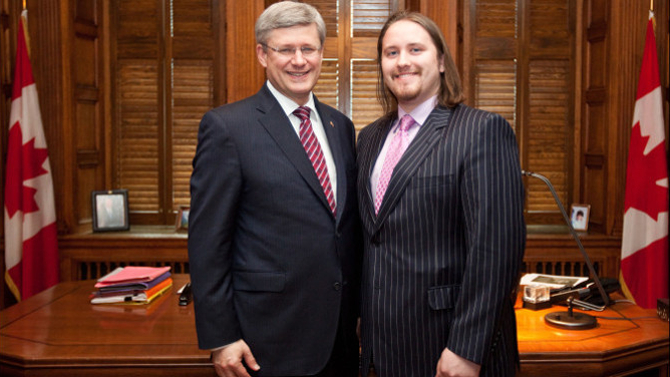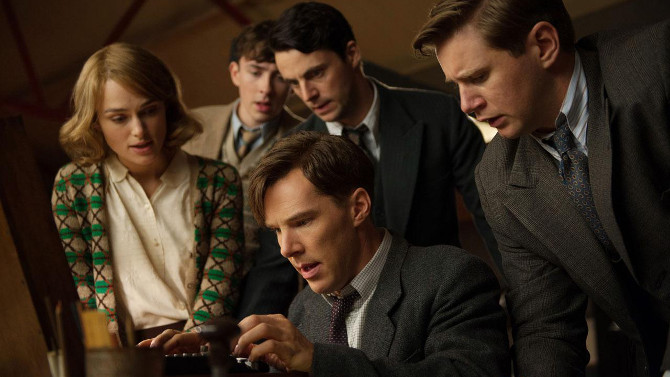One of the more critically acclaimed films to come out of 2014 was the World War 2 drama The Imitation Game, which follows Alan Turing, a mathematical prodigy who builds a machine that can break the Enigma – a German device that decodes their secret military messages. Someone who wholeheartedly agreed with the praise this movie received is former Canadian Prime Minister Stephen Harper – who proclaimed that it was easily his favourite film of 2014.
I must admit that I put the PM on the spot when I asked him about his front-runner for top movie, so he turned the direction of the conversation toward his pick from 2014 – calling The Imitation Game a superb and gripping historical drama.
The story, which is written by Graham Moore (who won an Academy Award for Best Adapted Screenplay for his reworking of Andrew Hodges’ text Alan Turing: The Enigma), follows three periods of our protagonist, Alan Turing’s (Benedict Cumberbatch) life – his more distant past where he attended private school; the present (1951), where he is being investigated by the police; and during World War 2, when he worked as part of a secret government program to crack the German cipher machine that passed its top secret messages during the six years of hostilities.
The main storyline is the one set during World War 2, where we watch the awkward, very literal game-player and loner, Turing, join a team that is meant to decode the German messages. They are led by Hugh Alexander (Matthew Goode), who in turn answers to military Commander Denniston (Charles Dance). There is also a government spook named Stewart Menzies (Mark Strong) who flits around in the shadows.
The team is tasked with deciphering the seemingly uncrackable cipher – which means that each and every day they must attempt to find the proverbial needle in a haystack (as the key is reset at midnight every evening). This means that there are 159,000,000,000,000,000,000,000 possible options each and every day. It is clear from the beginning that Turing is disliked by Denniston, Alexander and the rest of his compatriots.
Turing prefers to work alone on his machine, which he strongly believes will be able to break the German cipher. The rest of the team work tirelessly by hand – leading to an even greater divide between the loner and the group. Yet, when Turing is told to end his work, he runs his plans directly up to Prime Minister Winston Churchill who puts him in command of the group, creating an even larger chasm.
Turing designs a complex crossword to recruit new members to help him with his project. One of the surprising applicants is Joan Clarke (Keira Knightley), a woman who most men believe is overstepping the very strict gender boundaries of the era.
Turing helps the woman to become part of the project (lying to her parents to make them believe she is solely working with other ladies) and she it turn becomes his number one confidante. With her help, Turing slowly learns how to be a friend and leader to his team, who then aid him with Denniston, as he is always looking for a reason to fire the unorthodox man. The team finally makes a major breakthrough, saving many lives in the process but also leaving them with many more difficult decisions along the way.
In the earliest flashbacks, we watch a young Turing (played by Alex Lawther) deal with the troubles of being a “person who no one imagines anything of”. He has no friends and is rather brutally bullied. Yet, he finally finds a supporter in Christopher Morcom (Jack Bannon). It is this young boy who inspires our protagonist in many ways, including passing on his love of cryptography (writing or solving codes) to our main character.
The concluding story takes place in 1951, when Turing’s home is broken into. Detective Robert Nock (Rory Kinnear) is dismayed by Turing’s secrecy when they begin to investigate the crime and he fears that the man may be a Communist. He passes his concerns onto other officers and what they find is that the man is actually a homosexual (something illegal at that time in England). It is not what Nock expected to find and as he questions the man we can tell that he is intrigued by both the mathematician’s genius and secret work – yet it is too late and his fellow officers have already set the wheels in motion for his arrest.
The Imitation Game is an interesting historical drama that depicts both triumph and sorrow, love and pain. Some of the best moments are when past and present meet and we learn of subtle touching moments that link to Turing’s painful childhood. This motion picture also creates an excellent link to our present, depicting how far we have come in terms of equality between both men and women, straight and gay – as well as how much more respect and kindness is needed to further improve our world.
The acting is also of the upmost quality. Cumberbatch is able to bring forth a deep, dark sadness for this role. He is also perfect at depicting the very intelligent, literal, complicated, fragile and anti-social Turing. Knightley is, as always, solid in her performance. The symbiotic love that she shares with the male lead, which is based on her passion for his unorthodox persona and their simpatico intellects, is interestingly touching. Other performances, including those from Goode, Strong, Kinnear, Dance, as well as Allen Leech (who plays John Cairncross), also add to the quality of this production.
Director Morten Tyldum (who directed the superb Norwegian-Swedish action thriller Headhunters – which I reviewed back in 2014) is once again able to concoct an interesting film that works in so many ways. His transitions between the different time periods are especially worth highlighting – as they always transport us beautifully to another time and never make us feel like the story is disjointed. He is also able to get the most out of the historic period and his excellent cast of actors. In the end, it does not take a genius to figure out that it is well worth playing this game.



Viewed this last year. Cumberbatch is perfect for this conflicted part. The movie adds poignancy to two period injustices: homosexuality and female suppression. Great shot of you with Stephen Harper!
Great pic- and great movie choice by former PM Harper!